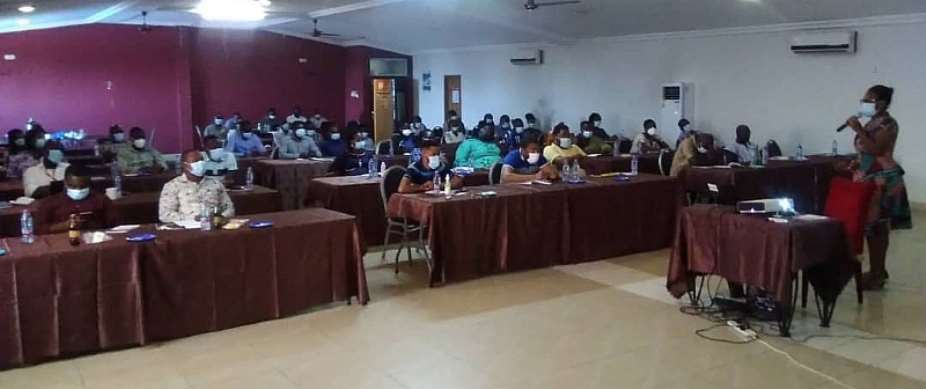A two-day cross-learning workshop on Citizen-led monitoring of HIV/AIDS service delivery being run under the Ghana Strengthening Accountability Mechanisms (GSAM) project has taken place in Sunyani.
Fifty participants from seven districts namely Ahanta West, Wassa East, Amenfi East, Amenfi Central, Sefwi-Akontomra, Bodi and Asunafo South took part in the programme organised by Care International and ISODEC together with some other CSOs, with funding by the USAID.
The participants were made up of anti-retroviral treatment nurses, HIV Focal Persons drawn from the implementing District Assemblies and District Health Directorates, Civil Society staff, John Snow Incorporated and a cross-section of the public.
The two-day workshop was primarily aimed at providing a platform for participants to advocate improved HIV/AIDS service delivery and equip them with quality standards for HIV/AIDS service delivery, especially at ART Centres.
It was also aimed at reflecting on the Citizen-led monitoring of HIV/AIDS service delivery over the past year, share experiences and strategise for the ensuing year.
The Deputy Chief of Party of Care International in-charge of the GSAM project, Samuel Addai Boateng, said in an interview that the Citizen-led monitoring of HIV/AIDS service delivery was initially implemented in four districts namely; Ahanta West, Wassa East, Amenfi East, Amenfi Central, but it is now being replicated in three more distircts namely; Sefwi-Akontomra, Bodi and Asunafo South due to the successes chalked in the past year.
He explained that the Citizen-led monitoring of HIV/AIDS service delivery project seeks to ensure that people who access the services ART Centres “are aware and they also have to make inputs into the way they have to be treated at the health facilities.”
This, he added, would ensure that “if there is anything that the health service providers are doing that they don’t like or that does not go according to the World Health Organisation Standards in HIV service delivery, it can be corrected so that the service being provided would meet the needs of the patients.”
“Over the past one year, the project has been very impactful. There were instances where in some districts, some of the HIV commodities (anti-retroviral drugs, lubricants, etc that are used to at ART Centres) were not available….but through dialogue and effective engagements with relevant stakeholders, the issue was corrected”, he added.
He also said it took the intervention of the project to get the lab equipment at the Efia-Nkwanta Hospital which was broken down for a long time to be repaired and put back to use while health facilities in the project areas which did not have laboratories to test HIV now have them.
He asked the participants to impart the knowledge gained at the workshop in their various intitutions and communities to ensure an improved HIV/AIDS service delivery in the country.
Making a presentation on the “role of ART Centres in HIV/AIDS care, the Ahanta West Municipal Director of Health, Timothy Kobina Ofori, said ART sites have a responsibility of providing HIV-related preventive care and treatment services essential for reducing the burden of HIV infection in the communities.
The ART Centres, he further said, “protect and ensure that people living with the HIV are protected against discrimination on the basis of their status under Section 504 of the Rehabilitation Act, 1973.”
Taking the participants through some “key issues identified during Citizen-led Monitoring of HIV/AIDS Service Delivery”, Divine Ntiamoah Berko, the Zonal Projector Coordinator, Care International, said stigmatization and discrimination remained a major challenge for HIV patients.
She mentioned “self-stigma, community level stigman and facility level stigma’ as the three levels of stigman identified so far.
She also raised concern about the non-availability of female condoms and lubricants in ART Centres.
Some of the participants blamed the low patronage of female condoms on the discomfort people go through when using them as compared to the male condoms.
They therefore called on the manufacturers of female condoms to redesign it to make it user-friendly to shore up its patronage.






 Tuesday’s downpour destroys ceiling of Circuit Court '8' in Accra
Tuesday’s downpour destroys ceiling of Circuit Court '8' in Accra
 SOEs shouldn't compromise on ethical standards, accountability – Akufo-Addo
SOEs shouldn't compromise on ethical standards, accountability – Akufo-Addo
 Father of 2-year-old boy attacked by dog appeals for financial support
Father of 2-year-old boy attacked by dog appeals for financial support
 Jubilee House National Security Operative allegedly swindles businessman over sa...
Jubilee House National Security Operative allegedly swindles businessman over sa...
 Nobody can order dumsor timetable except Energy Minister – Osafo-Maafo
Nobody can order dumsor timetable except Energy Minister – Osafo-Maafo
 Mahama wishes National Chief Imam as he clock 105 years today
Mahama wishes National Chief Imam as he clock 105 years today
 J.B.Danquah Adu’s murder trial: Case adjourned to April 29
J.B.Danquah Adu’s murder trial: Case adjourned to April 29
 High Court issues arrest warrant for former MASLOC Boss
High Court issues arrest warrant for former MASLOC Boss
 Align academic curriculum with industry needs — Stanbic Bank Ghana CEO advocates
Align academic curriculum with industry needs — Stanbic Bank Ghana CEO advocates
 Election 2024: We'll declare the results and let Ghanaians know we've won - Manh...
Election 2024: We'll declare the results and let Ghanaians know we've won - Manh...
